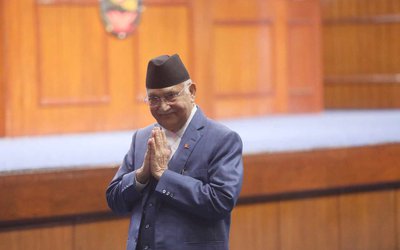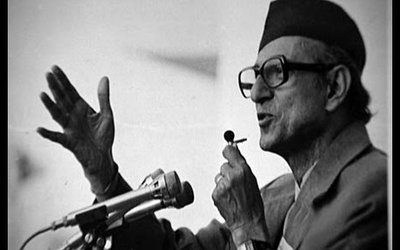Even as Maoist chairman Pushpa Kamal Dahal reached agreement with prime minister Jhalanath Khanal at the latter’s official Baluwatar residence on inducting the new Maoist faces into the cabinet, Maoist vice chairmen, Baburam Bhattarai and Narayan Kaji Shrestha were at senior UML leader Madhav Kumar Nepal’s private Koteshwor residence to seek the latter’s help resolve the cabinet expansion deadlock.
Nepal stood his ground and insisted on the immediate resignation of Khanal “to pave way for a national consensus government”. And the two vice chairmen left there disappointed.The drama at Baluwatar had just begun with a closed-door meeting between Khanal and his confidantes including party vice-chairmen, Bamdev Gautam and Ashok Rai, where Khanal briefed them about “agreement” reached with Dahal.The “agreement” was about the Maoists’ commitment to begin “concrete moves” to move the peace process forward within a week.
Minister Ghanashyam Bhusal was entrusted with the task of working out the details so that the Maoist ministers could be inducted into the cabinet. But a minister present in the meeting said, “the prime minister had not agreed to induct the new ministers without additional agreement with Dahal, although we have not been briefed about that deal.”
That Maoist chief Dahal decided to strike the “deal” with Khanal after a one-to-one meeting instead of his customary practice of taking along colleagues with him in talks with the prime minister and that Khanal also chose to brief the “deal” to the trusted vice chairman Bamdev Gautam only lent credence to the suspicion that the two top leaders had some covert agreement.
This has alarmed the Bhattarai faction of the Maoists. Said a politburo member Devendra Poudel, “the latest developments have killed the possibility of a consensus government for now. We suspect something in the one-to-one deal between Dahal and Khanal.”
Khanal had pledged to present the details of the deal at the party’s standing committee meeting, but he did not dare, after seeing that even supporters like Bharat Mohan Adhikary and Yubaraj Gyawali did not side with him.
Clearly pushed to a minority in the committee, Khanal barged out of the meeting, spoke to Prachanda on his cell and rushed to Shital Niwas to administer oath of office to the new Maoist ministers.
Said a UML politburo member Pashupati Chaulagai, “Khanal’s defiance of the party confirms that he trusts the Maoists more than own party for his survival.”
By acceding to the Maoist pressure while ignoring the decision of the UML standing committee, Khanal has played into the hands of the former rebels at the cost of the unity of own party.
But even more serious casualty will be the peace process and the constitution-making, because the Maoists are unlikely to meet the two-week deadline that prime minister Khanal set to them to build “convincing” grounds to complete the peace process especially addressing the vexing issue of the Maoist combatants.
A day after the deadline, senior vice chairman of the Maoist party, Mohan Vaidya, ruled out acting on it. “It’s out of question,” he said.
- FOREIGN EXCHANGE: Largest Deposit
- Jul 22, 2024
- IMF: Approval Of SDR
- Jul 22, 2024
- NEPAL-KOREA RELATIONS: Fifty-Years Of Warm Relations
- May 31, 2024
- NEPAL-BRITAIN: Centenary Celebration
- May 31, 2024
- POLITCS: Forming New Alliances
- May 27, 2024















